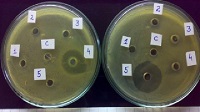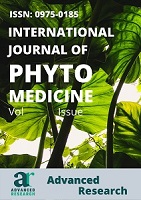Studies on Antibacterial Activity of Methanolic Plant Extracts
Keywords:
antimicrobial activity, methanolic extractsAbstract
The antimicrobial activity of methanolic extracts was screened against 3 gram positive and 3 gram negative bacteria using agar well diffusion method. 80 µl of test extract was suspended in the wells. A control well is loaded with equal amount of the solvent i.e. methanol. The plates were then incubated at 37ºC for 24-48 hours. After proper incubation the plates around the extract impregnated wells and this clear zone of growth inhibition was measured in terms of diameter (mm). The inhibition zone is the mean of the three replicates, excluding the well diameter. The (-) sign indicates no activity. Only the aqueous extracts of A. nilotica (leaf and stem) and L. inermis (leaves) were found inhibitory to some of the organisms tested i.e. Bacillus subtilis, Staphylococcus aureus, Escherichia coli, Klebsiela pneumoniae and Salmonella typhimurium. Salmonella typhimurium was only inhibited by aqueous extracts of L. inermis (leaves) whereas the rest of the aqueous extracts were found to be inactive against all the test organisms. The maximum activity was shown by aqueous extracts of L. inermis (leaf) against Staphylococcus aureus that is 1.9 mm diameter of inhibition zone and the minimum was observed in the case of aqueous extracts of Pergularia daemia (stem) i.e. 0.6 mm diameter of inhibition zone against Bacillus subtilis . Salmonella epidermidis was found to most resistance to aqueous extracts of the plant followed by Salmonella typhimurium.
References
Vlietinck AJ, Van Hoff L, Totte J, Lasure A,
Vanden Berghe, Roreangobo PC and
Mvukeyuniwami J. Ethnopharmacol J.
;46;31.
Poole K. Bacterial multidrug resistance
emphasis on efflux mechanisms in
Pseudomonas aeruginosa. J. Antimicrob.
chemother. 1994;34:453-456.
Schaechter M, Engleberg NC, Eisentein BI,
Medoff G. Mechanisms of microbial disease.
rd ed. Philadelphia, Lippincott, Williams &
Wilkins Silver L. L. (1993) Antimicrobial
agents. Chemother. 1999;37;377.
Duffy CF and Power RF. .Antioxidant and
antimicrobial properties of some Chinese
plant extracts. Int. J. Antimicrobial agents.
;17:527-529.
Nikaido H. Outer membrane barrier as a
mechanism of antimicrobial resistance.
Antimicrob. Agents chemother.
;33:1831-1836.
Parekh J, Nair R and Chanda S. Preliminary
screening of some folkloric plants from
western India for potential antimicrobial
activity. Indian J pharmacol (India). Perez P
Nair R and Chanda S. Anticandidal activity of
Punica granatum exhibited in different
solvents. Pharma. Biol. 2005;43;21-25.
Santos PRV, Oliveira ACX, Tomassini TCB.
Controle microbiogico de prudotos
fitoterapicos. Rev. Farm. Bioquim.
;31;35-38.



